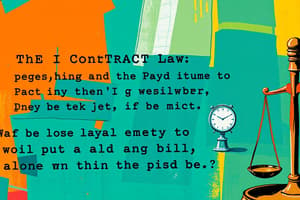Podcast
Questions and Answers
In McCutcheon v MacBrayne, what did Lord Reid suggest about the implication of conditions in contracts?
In McCutcheon v MacBrayne, what did Lord Reid suggest about the implication of conditions in contracts?
- Conditions could be implied if there was a series of similar contracts. (correct)
- Conditions are irrelevant if not mentioned.
- Parties cannot imply conditions in oral contracts.
- Conditions must always be explicitly referenced.
What was a key point made by Lord Pearce regarding the method of contract offer in McCutcheon v MacBrayne?
What was a key point made by Lord Pearce regarding the method of contract offer in McCutcheon v MacBrayne?
- Good faith is not relevant in oral contract offers.
- Conditions must always be disclosed to be valid.
- Oral contracts can be offered without reference to conditions. (correct)
- The contract must always be in writing.
Which case implies that a consistent course of dealing is often easier to establish among parties in the same trade?
Which case implies that a consistent course of dealing is often easier to establish among parties in the same trade?
- Interfoto Picture Library Ltd v Stiletto Visual Programmes Ltd
- Montgomery Litho Ltd v Maxwell
- British Crane Hire Corporation Ltd v Ipswich Plant Hire Ltd (correct)
- WS Karoulias SA v Drambuie Liqueur Co Ltd
What does the 'red hand rule' from the case Thornton v Shoe Lane Parking signify?
What does the 'red hand rule' from the case Thornton v Shoe Lane Parking signify?
In the context of incorporation by course of dealing, what might a course of dealing also result in, as per WS Karoulias SA v Drambuie Liqueur Co Ltd?
In the context of incorporation by course of dealing, what might a course of dealing also result in, as per WS Karoulias SA v Drambuie Liqueur Co Ltd?
What must a person bear if they have no knowledge of a bill of lading, according to the Parker v South Eastern Railway Co case?
What must a person bear if they have no knowledge of a bill of lading, according to the Parker v South Eastern Railway Co case?
In Thompson v London, Midland and Scottish Railway Co, what is explicitly stated about the excursion tickets?
In Thompson v London, Midland and Scottish Railway Co, what is explicitly stated about the excursion tickets?
What is required for terms to be incorporated by a course of dealing?
What is required for terms to be incorporated by a course of dealing?
What should a reasonable person realize regarding contract terms on a document?
What should a reasonable person realize regarding contract terms on a document?
What does the term 'course of dealing' refer to?
What does the term 'course of dealing' refer to?
What does incorporation of express terms by signature indicate?
What does incorporation of express terms by signature indicate?
Which of the following is NOT a method of incorporating express terms that have not been negotiated?
Which of the following is NOT a method of incorporating express terms that have not been negotiated?
How can express terms be incorporated by reference at the time of contracting?
How can express terms be incorporated by reference at the time of contracting?
What does 'course of dealing' refer to in the context of contract terms?
What does 'course of dealing' refer to in the context of contract terms?
In the context of express terms, which of the following best explains what is meant by Notice?
In the context of express terms, which of the following best explains what is meant by Notice?
Which case exemplifies the significance of signature in contract assent?
Which case exemplifies the significance of signature in contract assent?
When incorporating terms through course of dealing, which factor can significantly support the terms' enforceability?
When incorporating terms through course of dealing, which factor can significantly support the terms' enforceability?
What happens if a party to a contract does not read an email regarding new terms before agreeing?
What happens if a party to a contract does not read an email regarding new terms before agreeing?
Flashcards
Incorporation by Course of Dealing
Incorporation by Course of Dealing
Terms can be incorporated into a contract by showing a consistent pattern of previous similar contracts that included the terms.
McCutcheon v MacBrayne
McCutcheon v MacBrayne
A case illustrating that a consistent course of dealing is necessary for implied incorporation, highlighting that inconsistent practices prevent implied terms.
British Crane Hire Corporation v Ipswich Plant Hire
British Crane Hire Corporation v Ipswich Plant Hire
A case illustrating that similar trades make it easier to establish a course of dealing for incorporation.
Unusual or onerous terms
Unusual or onerous terms
Signup and view all the flashcards
Course of Dealing
Course of Dealing
Signup and view all the flashcards
Reasonable person test
Reasonable person test
Signup and view all the flashcards
Objective Assessment
Objective Assessment
Signup and view all the flashcards
Knowledge of the terms
Knowledge of the terms
Signup and view all the flashcards
Consistent Dealings
Consistent Dealings
Signup and view all the flashcards
Express Terms
Express Terms
Signup and view all the flashcards
Incorporation by Signature
Incorporation by Signature
Signup and view all the flashcards
Incorporation by Notice
Incorporation by Notice
Signup and view all the flashcards
Reference at the Time of Contracting
Reference at the Time of Contracting
Signup and view all the flashcards
What is assent?
What is assent?
Signup and view all the flashcards
How can a term be 'incorporated' into a contract?
How can a term be 'incorporated' into a contract?
Signup and view all the flashcards
Study Notes
Express Terms - Incorporation of Terms
- The focus is on circumstances where a non-negotiated express term becomes part of a contract.
- Express terms not previously negotiated can be incorporated in three ways:
- Signature
- Reference at the time of contracting (Notice)
- Course of dealing between the parties.
Example 1
- A bus company purchases 20 new electric buses.
- Passengers use the new buses.
- Students are asked to consider how express terms might be incorporated into contracts between the bus company and the supplier, and between the passenger and the bus company.
Example 2
- A student upgrades their mobile phone plan.
- They sign a contract with a local mobile phone shop.
- Students are asked to consider how the express terms might be included in the contract between the student and the mobile phone shop.
Example 3
- A café owner receives weekly deliveries of fresh fruit and vegetables from a local farm.
- A voice note is sent for pumpkins.
- The farmer replies with an email detailing a 25% increase in pumpkin price due to poor harvest and increased demand.
- Students are asked to consider how the express terms might be included in the contract between the café owner and the farm.
Incorporating Express Terms not Previously Negotiated - Quick Reminder
- Express terms (not negotiated) can be incorporated in three ways:
- Signature
- Reference at time of contracting (Notice)
- Course of dealing
Incorporation by Signature
- Effect: Indication of assent.
- Sundolitt v Addison [2017] CSIH 15: Assent to what?
- Montgomery Litho Ltd v Maxwell 1999 SLT 1431: Fair notice of unusual or special conditions.
- Brandon Hire Plc v Russell [2010] CSIH 76: Electronic equivalents of a signature (express assent).
- Online contracts: Electronic equivalents of a signature (express assent).
Incorporation by Reference to Terms and Conditions (1)
- Effect: Terms are incorporated if the document is contractual.
- Examples of contractual documents: Tickets, invoices, receipts, acceptance notes, delivery notes.
- Timing is crucial for incorporation.
- If the document is not contractual, it doesn't incorporate terms.
Incorporation by Reference to Terms and Conditions (2)
-
Taylor v Glasgow Corporation 1952 SC 440: Contracts with a "For conditions see other side" clause.
-
The Corporation of Glasgow is not responsible for any loss, injury, or damage sustained by persons using the establishment or its equipment.
-
Image source and link provided.
Incorporation by Reference to Terms and Conditions (3)
- Thornton v Shoe Lane Parking [1971] 2 QB 163: Reasonable sufficiency of notice test.
- Offer: Machine ready to take money.
- Acceptance: Placing money in the machine.
- Ticket: Subject to conditions displayed on premises.
- Indigo Park Services Ltd v Watson [2017] 9 WLUK 46: Relevant case discussed.
Incorporation by Reference to Terms and Conditions (4)
- Sign v Ticket:
- Chapelton v Barry Urban District Council [1940] 1 KB 532: Example of a sign versus a ticket scenario.
- Sign: "Barry Urban District Council. Cold Knap. Hire of chairs 2d. per session of 3 hours" -Ticket (front): “Barry Urban District Council. Cold Knap. Chair Ticket 2d. Not transferable" -Ticket (rear): “Available for three hours. Time expires where indicated by cut-off and should be retained and shown on request. The council will not be liable for any accident or damage arising from the hire of the chair"
- Relevant link provided.
Incorporation by Reference to Terms and Conditions (5)
- Olley v Marlborough Court Ltd [1949] 1 KB 532: The proprietors are not responsible for lost or stolen articles unless handed to the manageress for safe custody. The notice was inside the bedroom, after the contract was formed.
- Items were stolen from the room.
- Students should discuss with a neighbour: What questions should be asked?
Incorporation by Reference to Terms and Conditions (6)
- Olley v Marlborough Court Ltd [1949] 1 KB 532: Best way to prove incorporation is through a signed document or a notice of the terms at the time of the contract. A prominent, clear public notice in the contract will count as well. These stipulations must be clear.
Reference to Terms and Conditions - Ticket Cases (1)
- Parker v South Eastern Railway Co (1877) 2 CPD 416: Cloakroom ticket case.
- Front of Ticket: See back
- Rear of Ticket: The company will not be responsible for any package exceeding £10.
Reference to Terms and Conditions - Ticket Cases (2)
- Parker v South Eastern Railway Co (1877) 2 CPD 416: Discusses the responsibility of a man of business versus someone not familiar with the rules. A layperson should be informed of the terms.
Reference to Terms and Conditions - Ticket Cases (3)
- Thompson v London, Midland and Scottish Railway Co [1930] 1 KB 41: Excursion ticket case.
- Ticket front: "Excursion, see back" for conditions
- Ticket rear: Includes regulations of the railway company.
- Excursion Bill: Conditions shown in company's timetables.
- The condition that neither the holder nor any other person should have a right of action against the company due to injury or damage caused.
Incorporation by Course of Dealing (1)
- What is a course of dealing? A series of transactions prior to the one in question (e.g. prior contracts).
- What else is required? Objectively, the parties must know the conditions and have agreed to them.
Incorporation by Course of Dealing (2)
- McCutcheon v MacBrayne 1964 SC (HL) 23: Four previous dealings with a signed note but not in this particular case. A series of similar contracts that include certain conditions, and then a new contract, might lead to those conditions being implied.
Incorporation by Course of Dealing (3)
- McCutcheon v MacBrayne 1964 SC (HL) 23: A consistent course of dealing is not apparent (consistent course of asking for signature vs. accepting goods based on word).
Incorporation by Course of Dealing (4)
- British Crane Hire Corporation Ltd v Ipswich Plant Hire Ltd 1975 QB 303: Where parties are in similar trades, a course of dealing will be established more easily.
- WS Karoulias SA v Drambuie Liqueur Co Ltd [2005] CSOH 112: A course of dealing might preclude contractual effect (e.g. the preclusion of an implied contract due to the history of dealing).
Incorporation by Course of Dealing (5)
- Unusual or onerous terms.
- Montgomery Litho Ltd v Maxwell 1999 SLT 1431, Interfoto Picture Library Ltd v Stiletto Visual Programmes Ltd [1988] 1 ALL ER 348, Thornton v Shoe Lane Parking [1971] 2 QB 163 (Red hand rule).
Studying That Suits You
Use AI to generate personalized quizzes and flashcards to suit your learning preferences.




